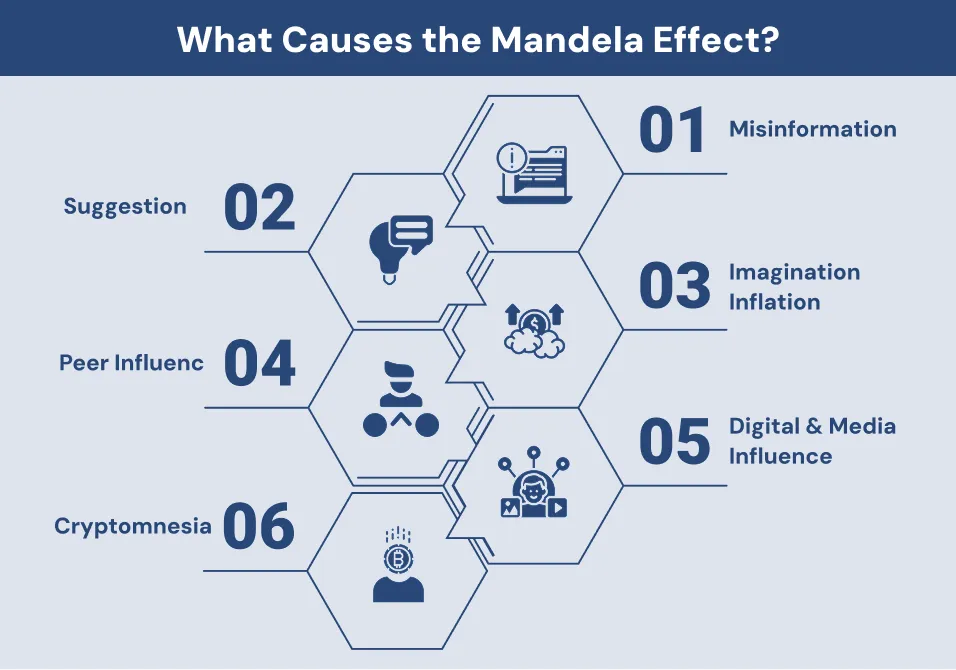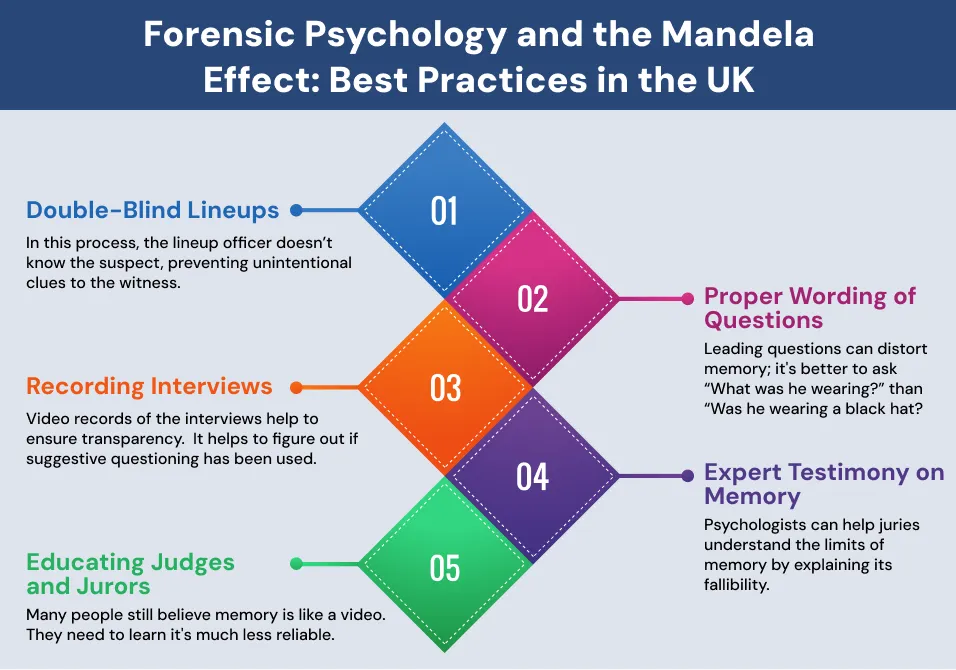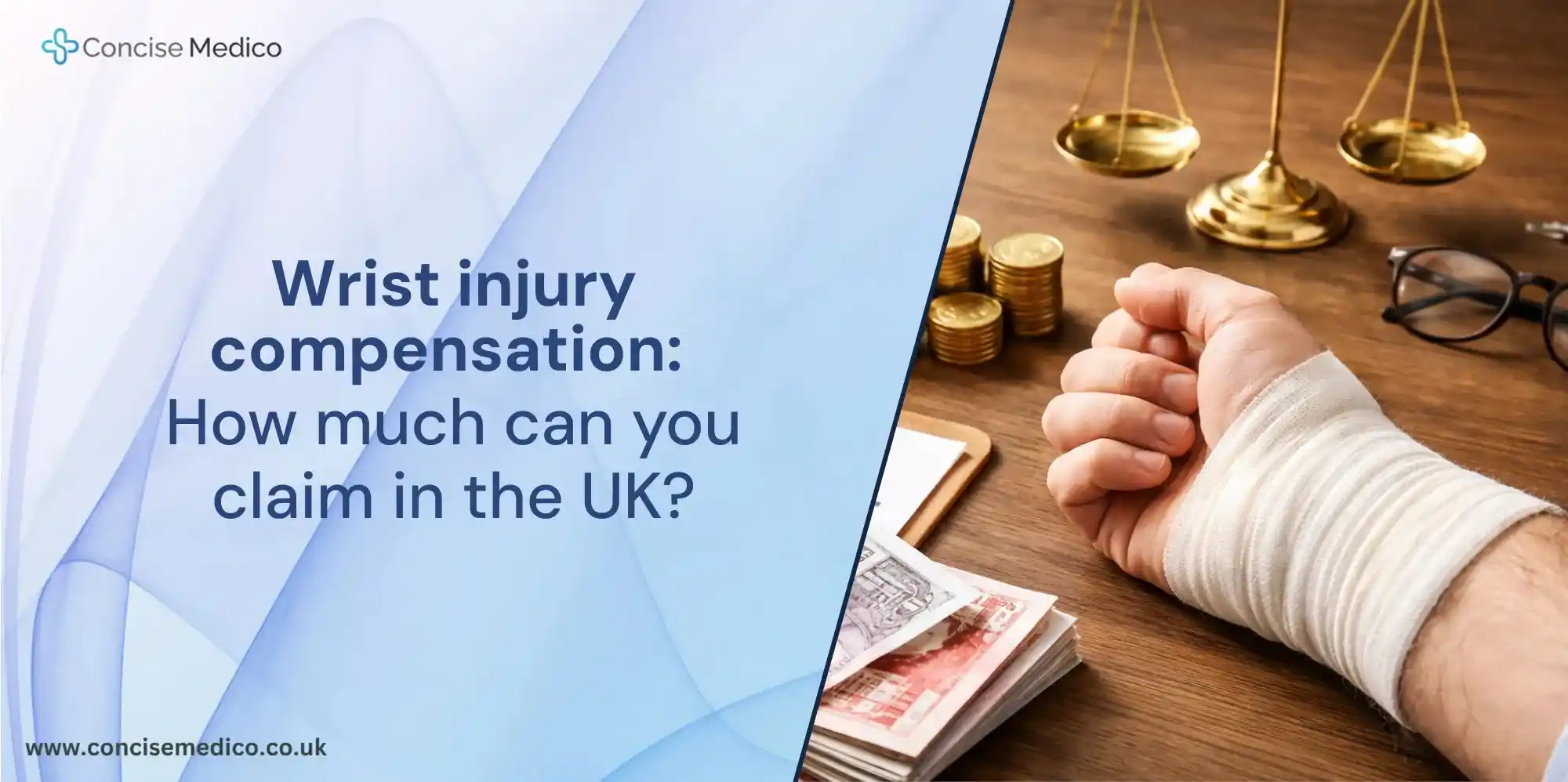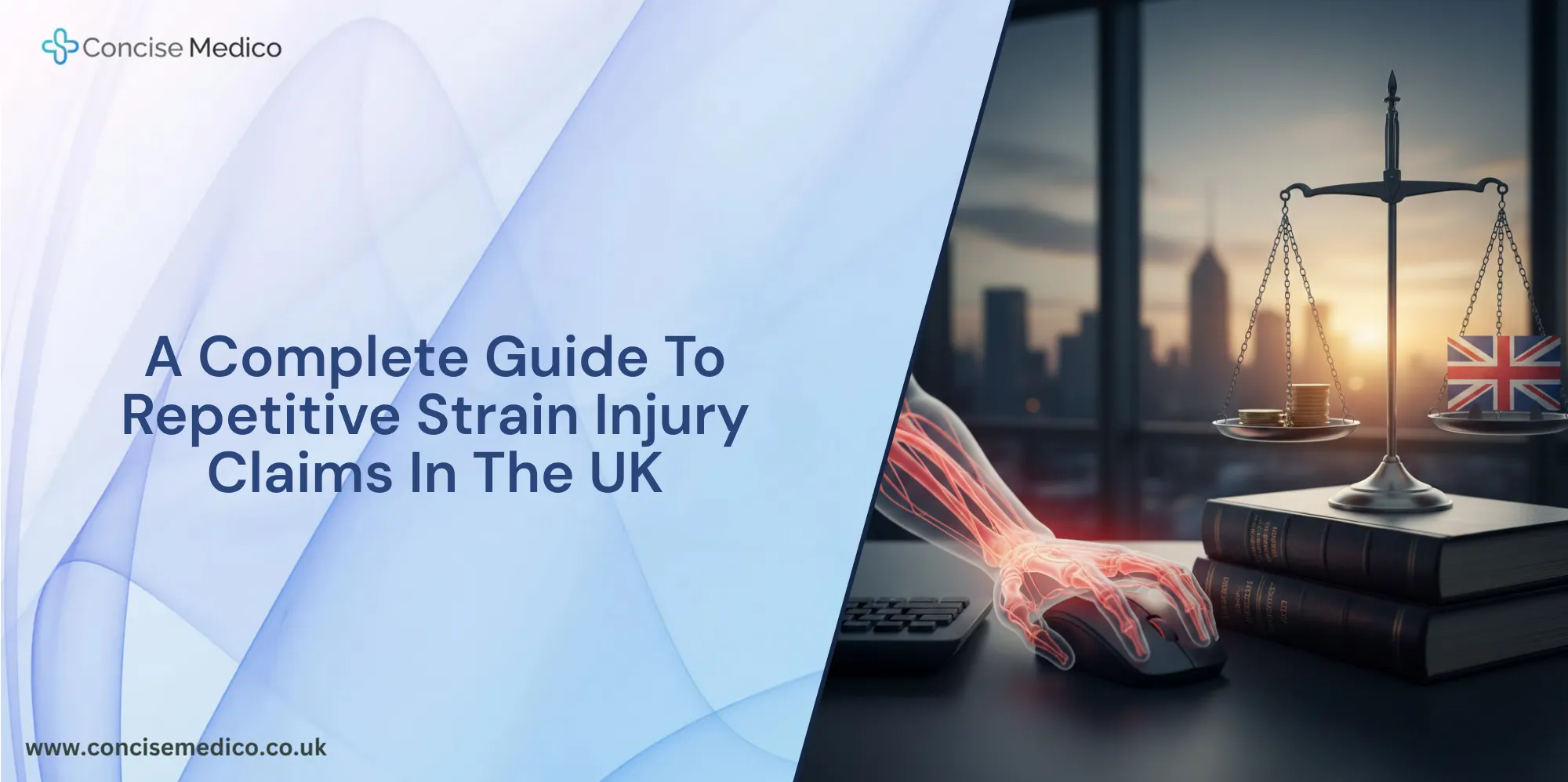TABLE OF CONTENT
- What Is the Mandela Effect?
- Mandela Effect Quiz
- Which direction is Mona Lisa smiling?
- What Are False Memories?
- The Mandela Effect in the UK Courtroom
- What the Science Says
- Real-Life Cases
- How Forensic Psychology Deals with Mandela Effect in the UK
- Why the Mandela Effect Is a Wake-Up Call
- Memory Is Not Always the Truth: What to Do?
- How Concise Medico Helps You?
- FAQs
Have you ever been in such a weird state where you remember something clearly, only to find out it never happened? You are not alone in this. This puzzling experience has a name, “The Mandela Effect”. And it goes beyond those funny internet debates about cartoon logos or movie lines that might be confusing. In the real world of forensic psychology, these memory errors can decide whether someone walks free out of the court or will spend years in prison. Let’s explore how the Mandela effect in the UK impacts its legal system and why it should be taken seriously.
What Is the Mandela Effect?
The Mandela effect in the UK refers to a large group of people not remembering the same thing. This term was first used by Fiona Broome. She was a paranormal researcher and had this belief that Nelson Mandela died in prison in the 1980s, even though he actually passed away in 2013.
It was just a false memory.
When she shared this belief online, many others agreed with her, although they were all wrong.
Famous Examples:
- “Berenstain Bears” vs. “Berenstein Bears”
Many swear the beloved children’s books were spelled with an “-ein” at the end. - The Monopoly Man’s Monocle
People often picture the Monopoly man also known as Rich Uncle Pennybags wearing a monocle. But he never wore one. - “Luke, I am your father”
Darth Vader never said this famous line in Star Wars. The real line was, “No, I am your father.” The line is misremembered as which is likely due to its common usage in pop culture and parodies.
These examples might seem funny. But when similar memory mistakes happen in court, they can ruin lives.
Mandela Effect Quiz
Also read more about What is Cognitive Bias and how can it impact your life ?
What Are False Memories?
False memories are memories of events that either didn’t happen at all or happened in a different way than remembered. They are not lies. The person truly believes what they’re saying.
“False memory is a very well known phenomenon, studied primarily in humans, corresponding to the formation of a new memory resulting from the combination of a remote memory and false information.”
What Causes the Mandela Effect?
Let’s get to know what causes the Mandela effect in the UK.
Memory isn’t like a video recording. It’s more like a puzzle your brain puts together. And sometimes, your brain fills in the wrong pieces.
Here are some causes:
1. Misinformation:
If you get to hear wrong details after an event it can change what you remember. This can lead to misinformation.
2. Suggestion:
Certain views of people may influence your thoughts and so the memory. For example, questions like “Did he have a gun?” may cause you to believe he had one even if he didn’t.
3. Imagination Inflation:
Thinking about something over and over can make it seem real. In this case your imagination starts to feel like a reality when in fact it is not.
4. Peer Influence:
If others remember something a certain way, you may adopt that version too. You may start considering it a reality and store it in that form.

5. Digital & Media Influence
Social media is one powerful tool that can influence the way you think. It causes you to build an opinion and then remember it as a fact. No matter whether these details are false or true.
6. Cryptomnesia
Here you forget the original source of a memory and start thinking that a certain thought is your own idea. It may be caused by some dream or hearing something on repeat.
The Mandela Effect in the UK Courtroom
The Mandela effect in the UK is taken quite seriously in the courts. For example, a witness testified that at a crime scene, they saw a man wearing a blue hoodie. While they were quite sure about it, the security footage showed that there was a man wearing a red jacket only. Although the witness is not lying here, they simply remember it wrong. This is an unreliable memory.
How False Memories Can Affect Legal Cases:
1. Eyewitness Errors
Studies show eyewitnesses are wrong up to 75% of the time in wrongful conviction cases. Even if they are confident about the details they know, there are chances of human error.
2. False Confessions
Intense questioning or pressure can make someone believe they committed a crime even if they didn’t. It occurs when a person is too tired of questioning, or also when a person already has self-doubt and starts doubting that maybe they have committed the crime.
3. Recovered Memories in Therapy
Some people “recover” memories of abuse years later. While some are real, others may be false memories created by suggestions, hypnosis or other therapeutic techniques. This is also a common occurrence of the Mandela effect in the UK.
Get some Legal Insights on Mental Health and Criminal Responsibility in the UK.
What the Science Says
There has been much research conducted to study the Mandela effect in the UK. Research shows that false memories are more common than you think. This is not just a theory. It’s been tested in labs.
Real-Life Cases
Case 1: Ronald Cotton
There was a case of a victim named Jennifer Thompson in 1984. She was sure that Ronald Cotton had raped her. She picked him as the criminal out of a lineup and then testified against him. He was sentenced to life in prison for this crime.But years later, DNA proved he was innocent. Although Jennifer’s memory felt accurate, it was not a reality. It was a case of the Mandela effect in the UK.
Case 2: Paul Ingram
In 1988, Paul Ingram was accused of horrible crimes by his own daughters. After long questioning, he confessed, even describing made-up events.
Experts later said he may have developed false memories under pressure.
How Forensic Psychology Deals with Mandela Effect in the UK
We can’t stop false memories completely. But there are ways to reduce their harm.
Best Practices in Forensic Psychology:
- Double-Blind Lineups
In this process, the officer showing the lineup doesn’t know who the suspect is. This prevents them from giving any type of clues to the witness. - Proper Wording of Questions
Leading questions can influence the memory. For example, instead of asking “Was he wearing a black hat?” it should rather be put as “Can you describe what he was wearing?” - Recording Interviews
Video records of the interviews help to ensure transparency. It helps to figure out if suggestive questioning has been used. - Expert Testimony on Memory
Having psychologists explain how memory works can help juries understand its limits. They can guide them about the fallibility of human memory.

- Educating Judges and Jurors
Many people still believe memory is like a video. They need to learn it’s much less reliable. It is crucial for the decision makers to know this fact and keep it in mind while deciding. In this way they can make informed decisions.
Explore the Top 5 Advantages of a Forensic Psychiatrist Near Me.
Why the Mandela Effect Is a Wake-Up Call
TheMandela Effect in the UK might seem like just an internet trivia. But it is a powerful reminder that many people can remember something completely wrong and also feel 100% sure that they are right.
In court, this can mean:
- Wrongful convictions
- Ruined reputations
- Loss of trust in the justice system
By knowing the fragility of memory well, forensic psychologists can help avoid such grave outcomes.
Memory Is Not Always the Truth: What to Do?
Your memories feel like the truth. But they’re not always accurate. It shows us that even collective memories can be wrong. In the justice system, understanding this isn’t just interesting, it’s essential. The Mandela Effect in the UK is quite common. Whether you’re a juror, lawyer, or just a concerned citizen, it’s important to know what it is and how to deal with such cases.
How Concise Medico Helps You?
At Concise Medico, we have a panel of the most-efficient forensic psychologists. If you have been victimised and are struggling with a case, you don’t have to worry anymore! Consult our experts in forensic psychology in court and instruct them regarding your case. With a proven success record, we’re confident you will access justice!
Our panel of experts is committed to providing top-notch medico-legal reports, and testimonies tailored to meet your specific needs.
FAQs
Have you ever been in such a weird state where you remember something clearly, only to find out it never happened? You are not alone in this. This puzzling experience has a name, “The Mandela Effect”. And it goes beyond those funny internet debates about cartoon logos or movie lines that might be confusing. In the real world of forensic psychology, these memory errors can decide whether someone walks free out of the court or will spend years in prison. Let’s explore how the Mandela effect in the UK impacts its legal system and why it should be taken seriously.
What Is the Mandela Effect?
The Mandela effect in the UK refers to a large group of people not remembering the same thing. This term was first used by Fiona Broome. She was a paranormal researcher and had this belief that Nelson Mandela died in prison in the 1980s, even though he actually passed away in 2013.
It was just a false memory.
When she shared this belief online, many others agreed with her, although they were all wrong.
Famous Examples:
- “Berenstain Bears” vs. “Berenstein Bears”
Many swear the beloved children’s books were spelled with an “-ein” at the end. - The Monopoly Man’s Monocle
People often picture the Monopoly man also known as Rich Uncle Pennybags wearing a monocle. But he never wore one. - “Luke, I am your father”
Darth Vader never said this famous line in Star Wars. The real line was, “No, I am your father.” The line is misremembered as which is likely due to its common usage in pop culture and parodies.
These examples might seem funny. But when similar memory mistakes happen in court, they can ruin lives.
Mandela Effect Quiz
Also read more about What is Cognitive Bias and how can it impact your life ?
What Are False Memories?
False memories are memories of events that either didn’t happen at all or happened in a different way than remembered. They are not lies. The person truly believes what they’re saying.
“False memory is a very well known phenomenon, studied primarily in humans, corresponding to the formation of a new memory resulting from the combination of a remote memory and false information.”
What Causes the Mandela Effect?
Let’s get to know what causes the Mandela effect in the UK.
Memory isn’t like a video recording. It’s more like a puzzle your brain puts together. And sometimes, your brain fills in the wrong pieces.
Here are some causes:
1. Misinformation:
If you get to hear wrong details after an event it can change what you remember. This can lead to misinformation.
2. Suggestion:
Certain views of people may influence your thoughts and so the memory. For example, questions like “Did he have a gun?” may cause you to believe he had one even if he didn’t.
3. Imagination Inflation:
Thinking about something over and over can make it seem real. In this case your imagination starts to feel like a reality when in fact it is not.
4. Peer Influence:
If others remember something a certain way, you may adopt that version too. You may start considering it a reality and store it in that form.

5. Digital & Media Influence
Social media is one powerful tool that can influence the way you think. It causes you to build an opinion and then remember it as a fact. No matter whether these details are false or true.
6. Cryptomnesia
Here you forget the original source of a memory and start thinking that a certain thought is your own idea. It may be caused by some dream or hearing something on repeat.
The Mandela Effect in the UK Courtroom
The Mandela effect in the UK is taken quite seriously in the courts. For example, a witness testified that at a crime scene, they saw a man wearing a blue hoodie. While they were quite sure about it, the security footage showed that there was a man wearing a red jacket only. Although the witness is not lying here, they simply remember it wrong. This is an unreliable memory.
How False Memories Can Affect Legal Cases:
1. Eyewitness Errors
Studies show eyewitnesses are wrong up to 75% of the time in wrongful conviction cases. Even if they are confident about the details they know, there are chances of human error.
2. False Confessions
Intense questioning or pressure can make someone believe they committed a crime even if they didn’t. It occurs when a person is too tired of questioning, or also when a person already has self-doubt and starts doubting that maybe they have committed the crime.
3. Recovered Memories in Therapy
Some people “recover” memories of abuse years later. While some are real, others may be false memories created by suggestions, hypnosis or other therapeutic techniques. This is also a common occurrence of the Mandela effect in the UK.
Get some Legal Insights on Mental Health and Criminal Responsibility in the UK.
What the Science Says
There has been much research conducted to study the Mandela effect in the UK. Research shows that false memories are more common than you think. This is not just a theory. It’s been tested in labs.
Real-Life Cases
Case 1: Ronald Cotton
There was a case of a victim named Jennifer Thompson in 1984. She was sure that Ronald Cotton had raped her. She picked him as the criminal out of a lineup and then testified against him. He was sentenced to life in prison for this crime.But years later, DNA proved he was innocent. Although Jennifer’s memory felt accurate, it was not a reality. It was a case of the Mandela effect in the UK.
Case 2: Paul Ingram
In 1988, Paul Ingram was accused of horrible crimes by his own daughters. After long questioning, he confessed, even describing made-up events.
Experts later said he may have developed false memories under pressure.
How Forensic Psychology Deals with Mandela Effect in the UK
We can’t stop false memories completely. But there are ways to reduce their harm.
Best Practices in Forensic Psychology:
- Double-Blind Lineups
In this process, the officer showing the lineup doesn’t know who the suspect is. This prevents them from giving any type of clues to the witness. - Proper Wording of Questions
Leading questions can influence the memory. For example, instead of asking “Was he wearing a black hat?” it should rather be put as “Can you describe what he was wearing?” - Recording Interviews
Video records of the interviews help to ensure transparency. It helps to figure out if suggestive questioning has been used. - Expert Testimony on Memory
Having psychologists explain how memory works can help juries understand its limits. They can guide them about the fallibility of human memory.

- Educating Judges and Jurors
Many people still believe memory is like a video. They need to learn it’s much less reliable. It is crucial for the decision makers to know this fact and keep it in mind while deciding. In this way they can make informed decisions.
Explore the Top 5 Advantages of a Forensic Psychiatrist Near Me.
Why the Mandela Effect Is a Wake-Up Call
TheMandela Effect in the UK might seem like just an internet trivia. But it is a powerful reminder that many people can remember something completely wrong and also feel 100% sure that they are right.
In court, this can mean:
- Wrongful convictions
- Ruined reputations
- Loss of trust in the justice system
By knowing the fragility of memory well, forensic psychologists can help avoid such grave outcomes.
Memory Is Not Always the Truth: What to Do?
Your memories feel like the truth. But they’re not always accurate. It shows us that even collective memories can be wrong. In the justice system, understanding this isn’t just interesting, it’s essential. The Mandela Effect in the UK is quite common. Whether you’re a juror, lawyer, or just a concerned citizen, it’s important to know what it is and how to deal with such cases.
How Concise Medico Helps You?
At Concise Medico, we have a panel of the most-efficient forensic psychologists. If you have been victimised and are struggling with a case, you don’t have to worry anymore! Consult our experts in forensic psychology in court and instruct them regarding your case. With a proven success record, we’re confident you will access justice!
Our panel of experts is committed to providing top-notch medico-legal reports, and testimonies tailored to meet your specific needs.




